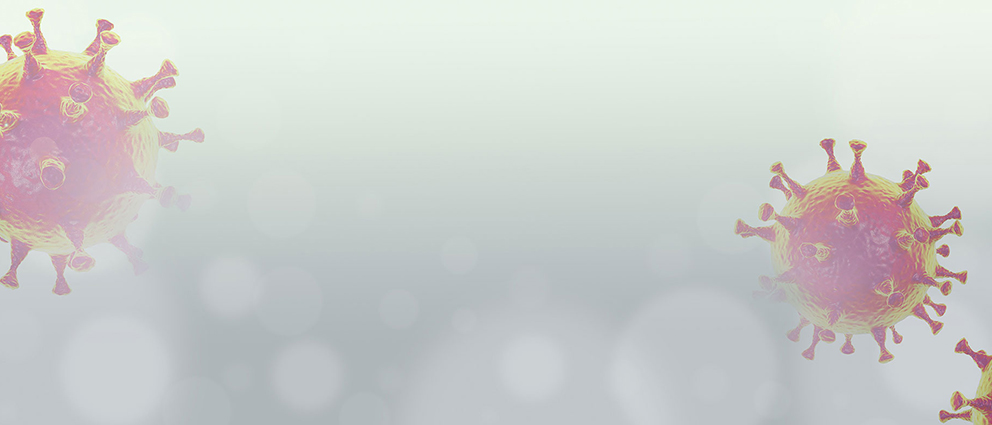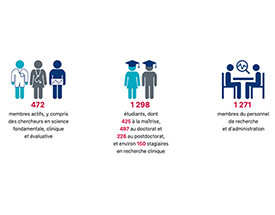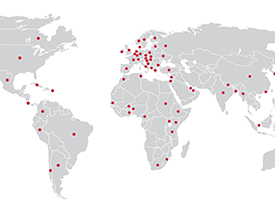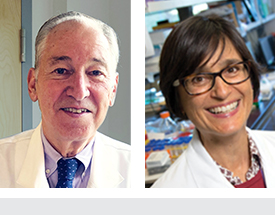- Accueil /
- À propos de nous /
- Rapports annuels /
- Rapport annuel 2021 /
- Surmonter la COVID-19

RAPPORT ANNUEL DE L’IR-CUSM 2021
CAP SUR UN MONDE POST-PANDÉMIE
« Une vision globale s’impose pour lutter contre une pandémie mondiale », déclare le Dr Don Sheppard, médecin en maladies infectieuses et microbiologiste médical. « Ce virus est tout nouveau pour la population humaine et nous voyons maintenant son évolution en action. »
En définissant/ notre réponse à la pandémie depuis le tout début, les scientifiques à l’Institut de recherche du Centre universitaire de santé McGill (IR-CUSM) ont relevé le défi avec des interventions inégalées aux niveaux local, national et international. Cet aperçu explore certaines des manières dont leurs efforts contribuent à réaliser cette vision mondiale.
- RENFORCER NOS LIGNES DE DÉFENSE
- COMPRENDRE LE VIRUS
- PROTÉGER LES PLUS VULNÉRABLES
- SURMONTER LA RÉTICENCE VACCINALE

RENFORCER NOS LIGNES DE DÉFENSE
De l’extérieur et de l’intérieur du laboratoire, les scientifiques de l’IR-CUSM fournissent les outils nécessaires pour naviguer vers un monde post-pandémie viable. « Ce virus apprend à vivre en nous comme une nouvelle espèce, en se mutant pour mieux nous infecter », a rappelé le Dr Don Sheppard aux téléspectateurs d’un téléjournal national après plus d’un an dans la lutte contre la COVID-19. Et, au moment de traverser une ou plusieurs vagues de variants, il a déclaré : « ce n’est pas le temps de penser localement. »
Le Dr Sheppard est l’un des chercheurs de l’IR-CUSM qui a pris l’initiative de demander une distribution mondiale de vaccins contre la COVID-19 plus équitable tout en exhortant les Canadiens à utiliser leur première et leur meilleure ligne de défense—les vaccins maintenant disponibles—afin de procurer un avantage contre le virus.
À McGill et à l’IR-CUSM, « nous étions parmi les premiers au Canada à détecter l’arrivée du variant Alpha au pays, qui signalait un changement dans la pandémie », explique-t-il. « Nous réalisons maintenant que sans un accès équitable et mondial aux vaccins, nous continuerons de forcer l’émergence de nouveaux variants dans des milieux à haute transmission et ceux-ci se déplaceront rapidement vers le Canada.
« Notre travail d’identification et de contrôle des variants fait partie de cette approche mondiale, tout comme les essais cliniques pionniers de nos chercheurs. »

Nos voix dans le Groupe de travail sur les thérapeutiques de la COVID-19 du Canada
Au cours de la pandémie, les activités de recherche intenses ont rivalisé avec le besoin de voir des scientifiques et des experts en santé publique participer à des initiatives de santé publique, de formulation de politiques et de sensibilisation. Toutefois, dans une période caractérisée par la distanciation sociale, plusieurs ont trouvé vivifiant le fait de travailler avec leurs homologues à travers le Canada.
Les docteurs Don Sheppard, Makeda Semret et Don Vinh, tous membres du Programme en maladies infectieuses et immunité en santé mondiale (MIISM) à l’IR-CUSM et chefs de l’Initiative interdisciplinaire en infection et immunité (MI4), ont uni leurs forces dans une importante ligne de défense contre la COVID-19. À l’été 2020, le gouvernement canadien a lancé le Groupe de travail sur les thérapeutiques de la COVID-19, dans le but d’évaluer les traitements au stade de développement et de fournir des conseils d’experts en ce qui a trait aux médicaments à se procurer et aux projets scientifiques à appuyer. Les trois collègues y ont siégé à titre de conseillers scientifiques.
À ce titre, ils ont participé à la révision de plus de 35 demandes au Fonds stratégique des sciences d’Innovation, Sciences et Développement économique Canada (ISDE) qui portaient toutes sur le développement de thérapeutiques de la COVID-19. Ils ont également prodigué des conseils pour assurer l’approvisionnement d’autres agents thérapeutiques pour traiter la COVID-19.
« Même lorsque la crise de santé publique sera terminée, des patients atteints de la COVID-19 continueront de se présenter à la clinique, et ce possiblement pour de nombreuses années si SRAS-CoV-2 devient un virus saisonner, et les médecins auront besoin de thérapeutiques pour les aider », a expliqué la Dre Semret au début de son mandat. Lorsque le groupe de travail a terminé son mandat au milieu de 2021, elle a déclaré : « Le nombre d’hospitalisations et de décès a amplement diminué avec les efforts de vaccination. D’un point de vue de gestion de cas individuels, je dirais que nous avons certainement une meilleure maîtrise des infections sévères qu’au début de la pandémie et cela continuera d’évoluer. »
Les participants au groupe de travail ont souligné l’importance d’anticiper de telles situations à l’avenir afin que le Canada soit mieux outillé pour traverser les futures pandémies. Leur travail a mené vers la création d’un groupe consultatif sur les thérapeutiques pour ISDE, sur lequel les Drs Vinh et Sheppard continuent de siéger.
Le Dr Vinh a sauté sur cette occasion d’aider des patients et le pays. En tant que chercheur et médecin qui se soucie des individus hospitalisés atteints de la COVID-19 sévère, il déclare : « Apporter la perspective médicale et l’angle de la recherche au niveau populationnel, et contribuer par le même fait à notre compréhension scientifique de la COVID-19, ainsi que conseiller le gouvernement fut un véritable honneur. »
Le Dr Sheppard conclut : « Voir la science évoluer d’un concept à une application clinique en un temps record a renforcé ma conviction que la recherche a le pouvoir de sauver et changer des vies. »
COMPRENDRE LE VIRUS

Tester la virulence des variants fait partie des stratégies privilégiées dans la lutte contre la COVID-19. Dans le cadre de projets majeurs cherchant à comprendre et prendre les devants de ce virus, la recherche fondamentale dépend de la présence d’un environnement d’étude sécuritaire. Dans les mois ayant suivi février 2020, lorsque le premier cas de COVID-19 fut rapporté au Québec, le Dr Marcel Behr a dirigé les efforts visant à redéfinir l’affectation d’installations existantes, afin de créer des locaux destinés aux nombreux chercheurs de McGill et de l’IR-CUSM, qui avaient déjà élaboré des plans pour faire progresser la recherche sur la COVID-19.
Certification pour effectuer de la recherche sur le SRAS-CoV-2… en un temps record
Scientifique senior du Programme en maladies infectieuses et immunité en santé mondiale à l’IR-CUSM, le Dr Behr dirige l’un des deux sites affiliés à l’Université McGill, la Plateforme de confinement de niveau 3 (CN3) du Centre de biologie translationnelle, hébergée à l’IR-CUSM. La plateforme fut créée pour soutenir la recherche sur la tuberculose, l’influenza et le VIH et elle comprend trois blocs indépendants, qui répondent tous aux Normes et lignes directrices canadiennes sur la biosécurité établies pour le deuxième niveau supérieur de biosécurité. Son potentiel fait d’elle un choix clair pour accueillir la recherche sur la COVID-19. La difficulté était le processus de certification rigoureux permettant d’effectuer de la recherche sur des pathogènes infectieux humains comme le SRAS-CoV-2, le virus causant la COVID-19.
Alors que l’état d’urgence publique a évolué vers une pandémie, le personnel de la Plateforme CN3, avec la collaboration des équipes des animaleries et de la santé, de la sécurité et de l’environnement à l’Université McGill et à l’IR-CUSM, était plus que déterminé à obtenir cette certification spéciale en un temps record. Leur réussite commune s’est avérée un tournant pour la recherche sur la COVID-19 au Québec et au Canada.
Sa licence ayant été modifiée à la fin mars 2020, la Plateforme CN3 à l’IR-CUSM était prête à recevoir son premier lot d’échantillons de virus en provenance de laboratoires de Québec, de Winnipeg et de Toronto. « En mai 2020, nous avons reçu trois différentes souches du virus. Par la suite, nous avons reçu d’autres souches, certaines d’entre elles étant désormais connues comme des variants préoccupants », dit le Dr Behr.
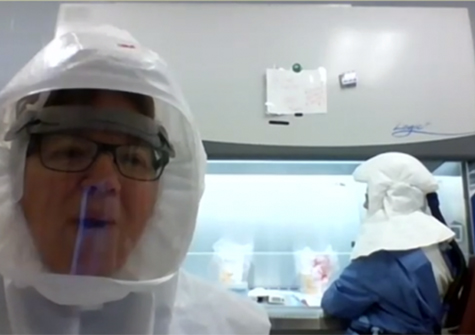
Des progrès rapides grâce à des partenariats
Silvia Vidal, Ph. D., une collègue du programme MIISM, travaille en étroite collaboration avec le Dr Behr afin d’élargir les possibilités de recherche. Elle est directrice du Centre des traits complexes de l’Université McGill et supervise la Plateforme CN3 affiliée à McGill située dans le pavillon Bellini du Complexe des sciences de la vie, où des chercheurs se sont principalement penchés sur la découverte de traitements antiviraux. « Les fondements de leurs travaux de recherche ont été l’identification de gènes prévenant la propagation de l’infection », explique Silvia Vidal. « Nous avions déjà créé une plateforme CN3 pour étudier la tuberculose, donc une grande partie de notre effort initial au milieu de 2020 fut axé sur la redéfinition de l’affectation de l’installation de manière qu’elle réponde aux besoins de nos chercheurs. »
Au sein des deux plateformes CN3, des chercheurs de McGill, avec leurs collaborateurs et des entreprises externes, réalisent actuellement des projets en lien avec la COVID-19. « Les travaux de certains groupes de chercheurs visent à modifier la réponse immunitaire à l’infection, ce qui documente la mise au point de vaccins, alors que les travaux d’autres groupes ont pour objectif de tester des composés dans le cadre d’une stratégie de traitement antiviral. Un troisième groupe utilise l’ARN afin de déterminer l’efficacité de certains outils diagnostiques », résume le Dr Behr.
De solides partenariats entre l’IR-CUSM, le CUSM et McGill ont permis à une idée d’évoluer rapidement vers une plateforme vouée à l’exécution de nouvelles recherches urgentes. Le Dr Behr est également directeur fondateur du Centre international de TB McGill et codirecteur de l’Initiative interdisciplinaire en infection et immunité de McGill (MI4), qui a collaboré avec la Fondation du CUSM pour financer plusieurs projets de recherche innovateurs sur la COVID-19 présentés dans le rapport annuel 2020 de l’IR-CUSM. En partie grâce à une subvention provenant de l’initiative MI4, les plateformes CN3 de McGill continueront d’offrir un lieu sécuritaire pour les travaux de recherche tant que la COVID-19 demeurera un agent pathogène pertinent.
PROTÉGER LES PLUS VULNÉRABLES
Qui est davantage à risque et pourquoi?
La COVID-19 est souvent plus sévère chez les personnes âgées de 60 ans et plus ou atteintes de problèmes de santé comme les maladies pulmonaires ou cardiaques, le diabète ou les maladies touchant le système immunitaire, selon l’Organisation mondiale de la santé. Au Canada, et particulièrement au Québec, les établissements de soins de longue durée ont compté un nombre disproportionné de décès liés à la COVID-19. Le Dr Don Vinh, chercheur-clinicien traitant des patients hospitalisés atteints de la maladie au CUSM depuis le début de la pandémie, savait qu’il était impératif de comprendre la raison pour laquelle certains sont plus vulnérables d’attraper la COVID-19.
Le Dr Vinh a fait partie d’un consortium international de chercheurs qui ont fourni une première réponse à cette question cruciale. Les deux études publiées par le groupe dans Science en octobre 2020 ont démontré qu’environ 15 pour cent des patients atteints de la COVID-19 et dont la vie est en péril ont une chose en commun : une anomalie dans l’activité d’interférons de type I (INF), des molécules du système immunitaire qui ont normalement une activité antivirale puissante. L’anomalie est causée soit par la présence d’autoanticorps visant directement ces molécules antivirales, soit par les anomalies génétiques diminuant leur production. Cette découverte pourrait permettre de détecter les personnes à risque de développer une forme sévère de la maladie dans tous les groupes d’âge et de mieux traiter les patients atteints de ces conditions.
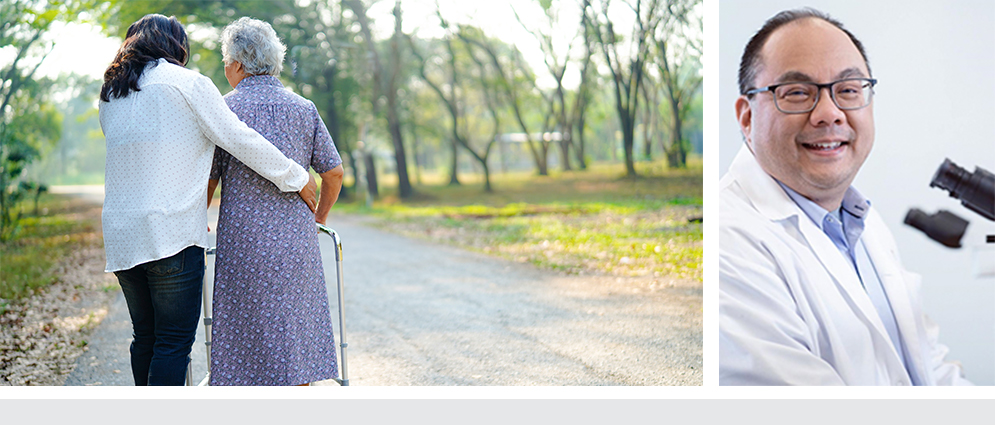
Le Dr Vinh collabore maintenant à une étude qui aidera le gouvernement fédéral à identifier les facteurs de risque associés au développement de symptômes et de complications sévères de la COVID-19 pouvant mener à une maladie mortelle. Cette étude multi-institutionnelle pour le Groupe de travail sur l’immunité face à la COVID-19 du Canada examine la relation entre le statut immunitaire, les marqueurs d’inflammation, les facteurs psychosociaux et la sévérité des symptômes de la COVID-19.
« Nous ne comprenons toujours pas pourquoi certains résidents en soins de longue durée ont été si malades et sont décédés de la COVID‑19, alors que d’autres au sein du même établissement ont eu une des formes plus légères de la maladie ou n’ont pas du tout été infectés », explique le Dr Vinh. « Notre étude réunit une expertise immunologique, biochimique et psychosociale pour identifier les facteurs clés qui déterminent les symptômes sévères de la COVID-19 et les complications chez les personnes âgées. » L’objectif est de mieux guider les mesures de contrôle des infections, d’améliorer les résultats aux traitements, de prioriser les soins de santé et d’éviter les hospitalisations non nécessaires.
Étude de séroprévalence de la COVID-19 par l’ÉLCV
Comme chercheuse principale de l’Étude longitudinale canadienne sur le vieillissement (ÉLCV), Christina Wolfson, Ph. D., détient un rôle de direction pour une autre initiative financée par le Groupe de travail sur l’immunité face à la COVID-19 du Canada. Le groupe de travail a investi 4 millions de dollars à l’automne 2020 pour mener une étude de séroprévalence sur le SRAS-CoV-2 portant sur les personnes âgées canadiennes. L’ÉLCV, une plateforme nationale de recherche sur le vieillissement au Canada dirigée par des chercheurs principaux à l’Université McMaster et l’Université Dalhousie, et Christina Wolfson à l’Université McGill, était particulièrement qualifiée pour mener ces travaux.
L’étude de séroprévalence de la COVID-19 dresse un portrait complet de la prévalence du virus du SRAS-CoV-2 et l’impact de la COVID-19 chez les adultes âgés au Canada. L’ÉLCV ne prélève pas uniquement des échantillons sanguins, elle établit également un lien entre l’information sur la présence d’anticorps et d’autres marqueurs immunitaires obtenus à partir d’analyses d’échantillons sanguins et de résultats et des questionnaires de plus de 18 000 participants à l’ÉLCV dans 10 provinces. Le questionnaire explore les symptômes, les facteurs de risque, l’utilisation des soins de santé et les impacts psychologiques et économiques de la COVID-19. L’information recueillie lors de l’étude de séroprévalence peut également être liée aux données collectées sur ces mêmes participants dans le cadre de deux vagues de collecte de données précédentes avant la pandémie.

« Notre meilleur moyen d’établir à quel point nous sommes près de contenir la pandémie est de suivre la présence d’anticorps dans la population », explique Christina Wolfson, membre du Programme en réparation du cerveau et en neurosciences intégratives à l’IR‑CUSM. « Avec des effets dévastateurs de la COVID-19 à tous les âges et un taux de mortalité accru chez les personnes âgées, il est impératif que nous accordions une attention particulière à l’évolution des profils d’anticorps chez les personnes âgées, qui seront très probablement différents de ceux des jeunes. »
Le but de cette étude de séroprévalence, selon la Dre Theresa Tham, administratrice en chef de la santé publique du Canada, est de planifier et viser des approches de santé publique en améliorant notre compréhension de l’immunité chez les populations à haut risque.
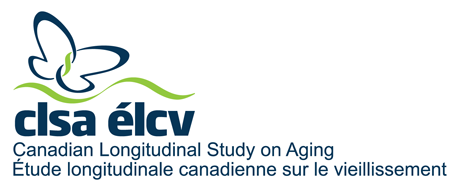
Dépistage actif des groupes prioritaires
Au début de l’automne 2020, une équipe de chercheurs de l’IR-CUSM ainsi que leurs collègues ont recommandé des tests de dépistage de la COVID-19 à grande échelle chez les groupes prioritaires, incluant les travailleurs de la santé, les étudiants et le personnel universitaire, ainsi que les employés des services essentiels. Le boursier postdoctoral Jonathon Campbell était premier auteur et le Dr Dick Menzies, membre du Programme de recherche translationnelle sur les maladies respiratoires, était auteur principal d’une étude d’analyse de coût publiée dans Canadian Medical Association Journal.
« Alors que les lieux de travail et les écoles rouvraient après la première vague de COVID-19 au Canada, des priorités et stratégies de dépistage étaient nécessaires afin de prévenir des hausses de transmission communautaire du SRAS-CoV-2 », explique le Dr Menzies. L’avantage de dépister à grande échelle, comme présenté dans l’étude, serait la détection et l’isolement de personnes asymptomatiques infectées par le SRAS-CoV-2.

Les chercheurs ont calculé les coûts, les besoins en matière de personnel et la capacité des laboratoires nécessaires au dépistage systématique de cinq groupes. Ces groupes comprennent des contacts de personnes ayant obtenu un résultat positif au SRAS-CoV-2 ainsi que quatre populations à risque : des membres du personnel hospitalier, des agents de santé communautaire et des personnes dans des établissements de soins de longue durée, des employés essentiels dans le milieu des affaires et des enfants d’âge scolaire et des membres du personnel scolaire.
« Nous croyons qu’une stratégie de dépistage actif des grands groupes de populations à risque accru d’attraper le SRAS-CoV-2 est faisable et abordable au Canada », ont conclu les auteurs. « Cette approche du dépistage devrait être une composante intégrale d’une vaste stratégie pour permettre à tous les Canadiens de retourner au travail et à l’école en toute sécurité. »
Protéger la santé mentale des familles vulnérables
Les ravages de la COVID-19 s’étendent à la santé mentale, et l’âge ne constitue pas un obstacle au stress. La Dre Lily Hechtman, psychiatre et scientifique senior dans le Programme en santé de l’enfant et en développement humain à l’IR-CUSM, a exploré de nouveaux facteurs socio-économiques et démographiques ayant un impact sur le mauvais fonctionnement familial, l’anxiété et les symptômes dépressifs en réponse aux mesures d’isolement chez les parents et enfants canadiens.
La plupart des familles ayant répondu à son questionnaire d’étude avaient subi un stress important en raison de la pandémie et du confinement. Le stress s’exprimait par de hauts taux de dépression et d’anxiété chez les parents et les enfants et un mauvais fonctionnement familial. Les familles vulnérables incluaient celles qui étaient déjà confrontées à des conditions médicales ou psychiatriques chez les enfants ou les parents, ainsi que les familles avec de jeunes parents, des revenus relativement faibles et des enfants âgés de plus de cinq ans.
« Par conséquent, nous devons avoir conscience du stress que la pandémie et le confinement causent chez les enfants, les parents et les familles et fournir un traitement et un soutien, particulièrement aux familles vulnérables », explique la Dre Hechtman.
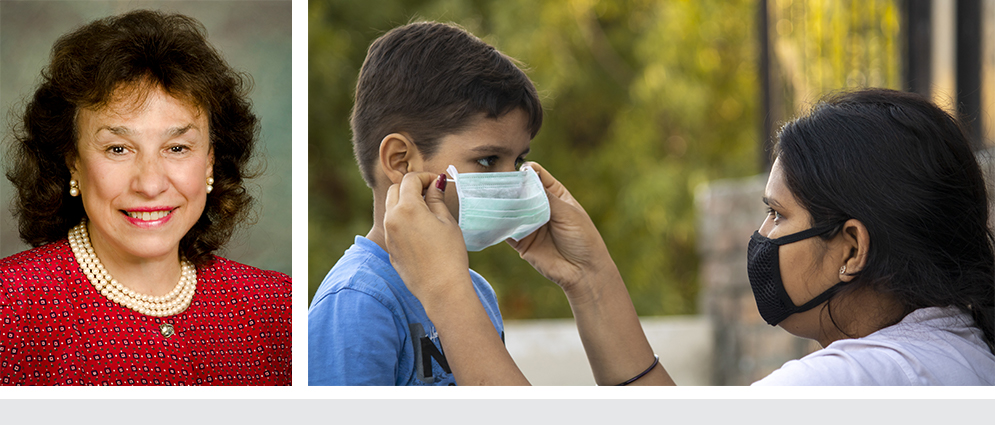
Protéger les patients atteints d’autres maladies
La lutte contre la COVID-19 a épuisé les ressources de soins de santé dans le monde entier et a réduit la disponibilité des soins pour les patients atteints d’autres maladies. Étant également à haut risque d’infection à la COVID-19, les personnes immunodéprimées et celles vivant avec d’autres problèmes de santé sont doublement vulnérables.
Membre du Programme de recherche sur le cancer à l’IR-CUSM, le Dr Nathaniel Bouganim est préoccupé par les taux de mortalité accrus de la COVID-19 chez les patients atteints du cancer, particulièrement ceux atteints du cancer du poumon. Avec deux collègues du CUSM, la Dre Suzanne Kazandjian et la Dre Arielle Elkrief, il a suivi et évalué les changements au niveau des plans de traitement pour protéger les patients atteints du cancer du poumon qui étaient vus à la clinique d’oncologie thoracique au Centre du cancer des Cèdres du CUSM au tout début de la pandémie. Publiés dans JAMA Oncology, leurs résultats soulignaient que « toutes les cliniques d’oncologie devraient suivre ces changements survenant au cours du traitement du cancer, puisqu’il deviendra important d’évaluer les effets de ces changements sur les résultats cliniques. »
« Nous savons maintenant quelles mesures devraient être prises pour protéger les patients se présentant à l’hôpital, et surtout, aucun élément ne prouve que les traitements du cancer augmentent le risque de conséquences graves à la COVID-19 », explique la Dre Elkrief, première auteure de l’étude.

Le Dr Madhukar Pai, scientifique senior dans le Programme en maladies infectieuses et immunité en santé mondiale à l’IR-CUSM, prône la mise en œuvre d’un plan de contrôle des dommages afin d’aider à atténuer les effets perturbateurs de la pandémie sur les services essentiels relatifs à la tuberculose (TB) dans les pays à revenu faible à moyen. En 2020, 1,4 million de personnes atteintes de la TB ont été omises par les systèmes de santé et cela, dit-il, a retardé les progrès de près d’une décennie.
Avec du financement de la Fondation Bill et Melinda Gates, le Dr Pai, qui est directeur adjoint du Centre international de TB de McGill, a aidé à contrôler les interruptions de services causées par la pandémie en Inde, en Indonésie et au Nigeria. Il a souligné la nature syndémique de la TB et de la COVID-19 en Inde dans une publication de BMJ Global Health et il a émis des suggestions dans Lancet Microbe pour apprendre de la COVID-19 afin de repenser les traitements de la TB.
Le Dr Pai a également reçu une subvention des Instituts de recherche en santé du Canada et du Centre de recherches pour le développement international pour évaluer une approche intégrée du dépistage de la COVID-19 et de la TB au Pérou. Puisque la toux et la fièvre sont des symptômes communs aux deux infections, une approche de dépistage intégrée pourrait aider à veiller à ce que la TB ne soit pas omise durant cette crise. Plus de 500 personnes ont été recrutées pour ce projet.
« En 2021, avons-nous vraiment besoin de justifier que nous faisons partie d’une société mondiale », demande le Dr Pai. Ses efforts pour mettre fin à la TB et pour parvenir à un accès aux soins de santé plus équitable dans le monde entier, incluant l’accès aux vaccins contre la COVID-19, ont mené à sa nomination à deux groupes d’experts de l’Organisation mondiale de la santé au milieu de 2021.
SURMONTER LA RÉTICENCE VACCINALE
Grâce à des décennies d’intenses recherches préliminaires canalisées à une seule année de développement, les premiers vaccins contre la COVID-19 furent complètement autorisés à être utilisés au Canada à la fin 2020. En sachant que ceci ne réduirait pas le risque et n’éliminerait pas la COVID-19 à moins que la majorité des personnes accepte de se faire vacciner, quatre chercheurs de l’IR‑CUSM du Programme en maladies infectieuses et immunité en santé mondiale ont eu la bonne idée de rapidement lancer des projets visant à surmonter les obstacles liés à la vaccination. La Dre Nadine Kronfli s’est concentrée sur l’adoption des vaccins en milieu carcéral canadien et le Dr Abhinac Sharma, sur les patients cardiovasculaires. La Dre Inés Colmegna et le Dr Moshe Ben-Shoshan ont étudié l’adoption des vaccins chez les adultes et les enfants, respectivement.
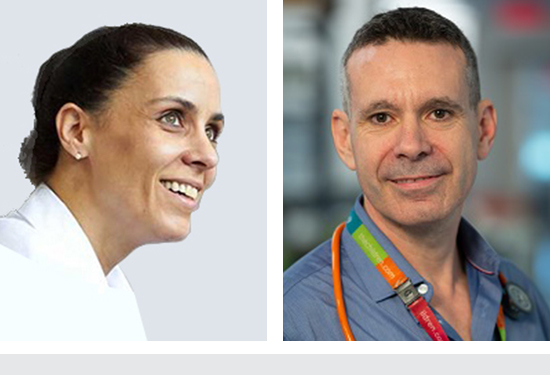
Préparer les adultes au vaccin contre la COVID-19
L’étude « PROVIDE-A » de la Dre Colmegna, qui avait pour cible la population adulte, a adapté des mesures avérées efficaces pour améliorer l’adoption des vaccins autres que celui contre la COVID-19. À l’aide de connaissances acquises au CUSM dans le cadre de travaux sur l’acceptation du vaccin contre l’influenza chez les personnes vivant avec des maladies rhumatismales, son équipe avait pour objectif principal d’identifier les attitudes, les croyances et les comportements liés aux vaccins contre la COVID-19. Ils cherchaient par la suite à encourager les membres de la communauté de McGill et les travailleurs de la santé du CUSM à promouvoir activement l’adoption des vaccins contre la COVID-19.
L’équipe a sondé 1 793 personnes immunisées contre l’influenza, incluant des travailleurs de la santé du CUSM, pour évaluer le taux d’acceptation d’un futur vaccin contre la COVID-19 et identifier des déterminants potentiels de non-acceptation. Les préoccupations en matière de sécurité des vaccins et l’opposition à la vaccination obligatoire se sont avérées les plus grands prédicteurs de refus de vaccination. Ces résultats, ainsi qu’un sondage sur les raisons de refuser de prendre rendez-vous pour recevoir le vaccin contre la COVID-19 parmi le personnel du CUSM, ont aidé à déterminer les manières optimales d’aborder les malentendus et de mener des stratégies d’intervention.
« Depuis que les vaccins contre la COVID-19 ont été introduits, il y a eu une hausse de l’adoption des vaccins par le personnel du CUSM, ainsi que par d’autres groupes », explique la Dre Colmegna. « Les effets individuels des multiples interventions ayant pour but de promouvoir l’acceptation du vaccin, combinés à des données de sécurité réconfortantes provenant du monde entier ainsi qu’à une compréhension des risques associés à la COVID-19 ont encouragé l’acceptation des vaccins. »
Les obstacles à la vaccination des enfants
Le Dr Moshe Ben-Shoshan, allergologue et immunologue pédiatrique, a anticipé l’admissibilité des enfants à la vaccination lorsqu’il a créé l’étude COVERS, pour COvid Vaccine Evaluation of Resources and Solutions (Évaluation des ressources et des solutions du vaccin contre la COVID-19), avec des collègues du Canada et de la Suède. L’étude visait à identifier des obstacles potentiels à l’acceptation, la distribution et l’administration des vaccins dans un contexte familial.
Les parents d’enfants à la clinique d’allergie de l’Hôpital de Montréal pour enfants ainsi qu’à un bureau d’allergie privé ont été invités à remplir un sondage en ligne anonyme sur la COVID-19 au milieu de 2021. Plus de trois quarts des 97 répondants ont indiqué qu’ils feraient vacciner leurs enfants contre la COVID-19. La peur liée aux effets indésirables fut l’obstacle le plus commun à la vaccination (49,5 %). Plus de la moitié des participants ont rapporté que le fait de recevoir davantage d’information augmenterait leur volonté à recevoir le vaccin, les vidéos étant leur méthode privilégiée.
« Il existe toujours des écarts de connaissance importants chez les parents en ce qui a trait à la vaccination des enfants », conclut le Dr Ben‑Shoshan. « Plus particulièrement, plus d’un tiers de nos répondants avaient toujours des craintes envers la vaccination en présence d’antécédents d’allergies, bien que les recommandations de la Société canadienne d’allergie et d’immunologie clinique précisent que ce n’est pas une contre-indication. » Une vidéo abordant les préoccupations des parents mentionnées dans le cadre de l’étude sera publiée en septembre 2021.

L’importance de la sensibilisation
Alors que nous traversons de nouvelles vagues de la pandémie engendrées par des variants du virus, la recherche à elle seule ne peut aborder les enjeux de confiance à la base de la réticence à l'égard de la vaccination. La communauté de l’IR-CUSM s’est également investie dans le rétablissement de la confiance en la science et les scientifiques. Ses stagiaires de recherche sont des ambassadeurs naturels.
« Il est particulièrement important pour les membres de différentes communautés d’être représentés durant les campagnes de vaccination nationales ou régionales, ainsi que dans les milieux de soins de santé », explique Adam Hassan, un étudiant au doctorat à l’IR-CUSM. Lashanda Skerritt, une autre stagiaire à l’IR-CUSM qui est inscrite au programme double M.D.C.M.-Ph. D., et lui, ainsi que deux chercheurs, le Dr Momar Ndao et la Dre Makeda Semret, étaient des panélistes dans le cadre d’un webinaire national pour la communauté noire qui introduisait une série d’événements organisée par la Fédération des Canadiens noirs en mars 2021. Khandideh Williams, étudiante en médecine familiale à McGill, a animé le webinaire « Black Health and COVID-19 » (La santé des Noirs et la COVID-19), qui visait à aborder la mésinformation et les préoccupations communautaires relativement au vaccin.
Les questions des participants de plusieurs provinces, auxquelles ont répondu les panélistes, ciblaient des sujets allant des préoccupations propres à la santé aux informations contradictoires ou confuses rapportées par les médias.
« Nous avons également eu l’occasion d’aborder des questions visant l’impact de la COVID-19 sur les communautés noires du Québec », déclare Lashanda Skerritt. « Nous avons notamment évoqué la raison pour laquelle les données de ce moment-là indiquaient que les communautés racisées et immigrantes de Montréal étaient davantage touchées par la COVID-19 et ce pour quoi il était particulièrement important que les gens reçoivent le vaccin aussitôt qu’il leur serait offert. »
« Il semblait opportun que les membres du panel d’experts faisaient partie de la communauté noire », ajoute-t-elle. « L’événement soulignait la valeur du fait de soutenir les initiatives communautaires et les approches adaptées aux différences culturelles dans le but d’encourager l’adoption des vaccins. »
Nouvelles connexes
- Exercer un suivi sur l’émergence des variants de la COVID-19 d’intérêt au Canada
- Behind the scenes on Canada’s COVID-19 Therapeutics Task Force (en anglais uniquement)
- Une plateforme de confinement de niveau 3 fait progresser la recherche à l’IR-CUSM et à l’Université McGill
- COVID-19 : nos chercheurs répondent à l’appel
- Une nouvelle étude menée dans des établissements de soins de longue durée
- De l'infection silencieuse à la mort rapide : Pourquoi certaines personnes sont-elles plus vulnérables à la COVID-19 ?
- Le Groupe de travail sur l’immunité face à la COVID-19 finance une nouvelle étude de séroprévalence du SRAS-CoV-2 exhaustive axée sur les canadiens vieillissants
- Dépistage systématique des groupes à risque accru de SRAS-CoV-2 : une approche abordable et raisonnable
- Protéger les patients atteints d'un cancer du poumon contre la COVID-19 – et apprendre de l'expérience
- Deux millions de dollars pour atténuer les conséquences dévastatrices de la COVID-19 sur la prise en charge de la tuberculose
- India’s syndemic of tuberculosis and COVID-19 (en anglais uniquement)
- Learning from COVID-19 to reimagine tuberculosis diagnosis (en anglais uniquement)
- Contrer la réticence face à la vaccination
- Results of MI4 Overcoming Barriers to COVID-19 Vaccination Research Funding Program (en anglais uniquement)
- La chercheuse de l'IR-CUSM Sasha Bernatsky dirige une étude nationale sur la vaccination contre la COVID-19
- Vaccination COVID-19 : C’est notre opportunité (Vidéo du CUSM sur YouTube)
- Le vaccine contre la COVID-19 chez les enfants : une vidéo explicative (Vidéo du CUSM sur YouTube)
- Des stagiaires de recherche comblent le fossé existant entre le milieu scientifique et le grand public
